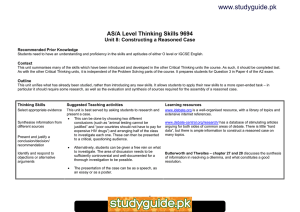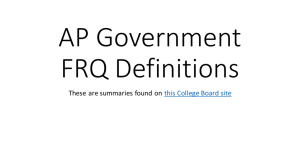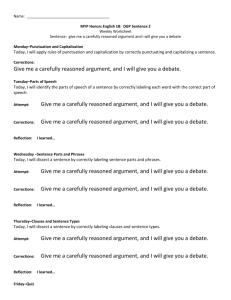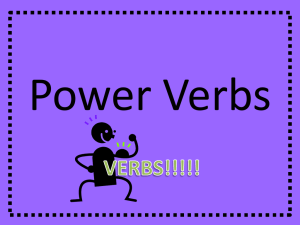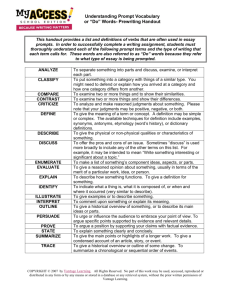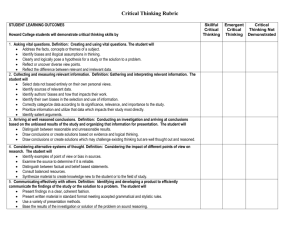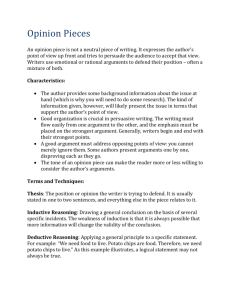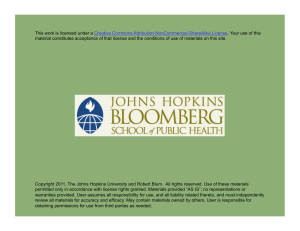The challenge is to articulate a conception of critical thinking that:
advertisement
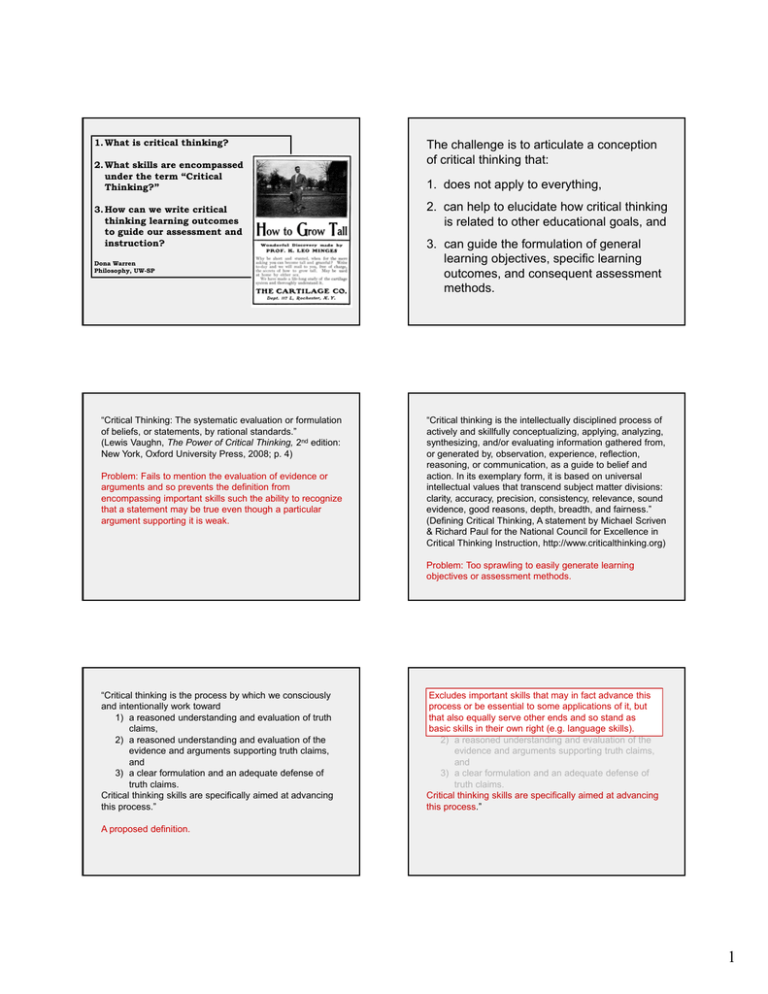
1. What is critical thinking? 2. What skills are encompassed under the term “Critical Thinking?” 3. How can we write critical thinking learning outcomes to guide our assessment and instruction? Dona Warren Philosophy, UW-SP “Critical Thinking: The systematic evaluation or formulation of beliefs, or statements, by rational standards.” (Lewis Vaughn, The Power of Critical Thinking, 2nd edition: New York, Oxford University Press, 2008; p. 4) Problem: Fails to mention the evaluation of evidence or arguments and so prevents the definition from encompassing i iimportant t t skills kill such h th the ability bilit tto recognize i that a statement may be true even though a particular argument supporting it is weak. The challenge is to articulate a conception of critical thinking that: 1. does not apply to everything, 2. can help to elucidate how critical thinking is related to other educational goals goals, and 3. can guide the formulation of general learning objectives, specific learning outcomes, and consequent assessment methods. “Critical thinking is the intellectually disciplined process of actively and skillfully conceptualizing, applying, analyzing, synthesizing, and/or evaluating information gathered from, or generated by, observation, experience, reflection, reasoning, or communication, as a guide to belief and action. In its exemplary form, it is based on universal intellectual values that transcend subject matter divisions: clarity, l it accuracy, precision, i i consistency, i t relevance, l sound d evidence, good reasons, depth, breadth, and fairness.” (Defining Critical Thinking, A statement by Michael Scriven & Richard Paul for the National Council for Excellence in Critical Thinking Instruction, http://www.criticalthinking.org) Problem: Too sprawling to easily generate learning objectives or assessment methods. “Critical thinking is the process by which we consciously and intentionally work toward 1) a reasoned understanding and evaluation of truth claims, 2) a reasoned understanding and evaluation of the evidence and arguments supporting truth claims, and 3) a clear l fformulation l ti and d an adequate d t d defense f off truth claims. Critical thinking skills are specifically aimed at advancing this process.” “Critical Excludes thinking important is the skills process that may by which in factwe advance consciously this and process intentionally or be essential work toward to some applications of it, but that1)also a reasoned equally serve understanding other endsand andevaluation so stand as of truth basic skills in their own right (e.g. language skills). claims, 2) a reasoned understanding and evaluation of the evidence and arguments supporting truth claims, and 3) a clear l fformulation l ti and d an adequate d t d defense f off truth claims. Critical thinking skills are specifically aimed at advancing this process.” A proposed definition. 1 “Critical Excludes thinking other important is the process skills by and which abilities we consciously (e.g. and intentionally knowledge, work towardcreativity). subject-specific 1) a reasoned understanding and evaluation of truth Many of the excluded skills and abilities support and claims, rely upon the application of critical thinking skills (e.g. 2) a reasoned understanding and evaluation of the subject-specific knowledge helps us to evaluate truth evidence and arguments supporting truth claims, claims, creativity allows us to generate novel truth and ) claims). 3) a clear l fformulation l ti and d an adequate d t d defense f off truth claims. Critical thinking skills are specifically aimed at advancing this process.” “Critical Decisionthinking makingisand the problem process solving by which are wehybrid consciously skills and work thinking toward (to generate novel ideas) that intentionally involves creative a reasoned andclaims evaluation truth and1)critical thinkingunderstanding (to defend truth of theof sort / claims, “The best decision is,” / “The best solution to this 2) a reasoned understanding and evaluation of the problem is”). evidence and arguments supporting truth claims, and 3) a clear l fformulation l ti and d an adequate d t d defense f off truth claims. Critical thinking skills are specifically aimed at advancing this process.” “Critical thinking is the process by which we consciously and intentionally work toward 1) a reasoned understanding and evaluation of truth claims, 2) a reasoned understanding and evaluation of the evidence and arguments supporting truth claims, and Truth claims are distinguished g from evidence and 3) a clear l fformulation l ti and d an adequate d t d defense f off arguments. truth claims. We canthinking understand claim without understanding the Critical skillsaare specifically aimed at advancing evidence or argument supporting it. this process.” “Critical thinking is the process by which we consciously and intentionally work toward 1) a reasoned understanding and evaluation of truth claims, 2) a reasoned understanding and evaluation of the evidence and arguments supporting truth claims, and Understanding g is distinguished g from evaluation. 3) a clear l fformulation l ti and d an adequate d t d defense f off We can understand truth claims. a claim or an argument without evaluating it. skills are specifically aimed at advancing Critical thinking this process.” Understanding and evaluation are equally important to critical thinking. We can agree with a claim while rejecting the evidence or argument supporting it. “Critical thinking is the process by which we consciously and intentionally work toward 1) a reasoned understanding and evaluation of truth claims, 2) a reasoned understanding and evaluation of the evidence and arguments supporting truth claims, and “Reasoned” understandings g and evaluations needn’t be 3) a clear l fformulation l ti and d an adequate d t d defense f off identical. truth claims. The goal of evaluation is specifically to encourage students to form Critical thinking skills are aimed at advancing theirprocess.” own, reasoned, opinions. this “Critical thinking is the process by which we consciously and intentionally work toward 1) a reasoned understanding and evaluation of truth claims, 2) a reasoned understanding and evaluation of the evidence and arguments supporting truth claims, and 3) a clear l f formulation l ti and d an adequate d t defense d f off truth claims. Critical thinking skills are aimed advancing Formulating a position is specifically distinguished fromatdefending it. this process.” We can formulate a claim without adequately defending it. 2 Critical Thinking Learning Objectives Demonstrate a reasoned understanding and evaluation of truth claims. Demonstrate a reasoned a) understanding and b) evaluation of truth claims. Less Difficult a) Given a truth claim, anticipate its probable consequences. b) Assess a claim by determining g whether or not its consequences obtain. Demonstrate D t t a reasoned d understanding d t di and d evaluation l ti of the evidence and argument supporting truth claims. More Difficult Formulate and adequately defend truth claims. Not Subject-Specific (Appropriate to Gen. Ed. Courses) a) Explain why a sentence of the form “P, if Q,” is not equivalent to a statement of the form “P only if Q.” b) Evaluate an “if… then…” statement. Demonstrate a reasoned a) understanding and b) evaluation of the evidence and argument supporting truth claims. Not Subject-Specific (Appropriate to Gen. Ed. Courses) a) Identify what claims are being taken for granted in an argument. Less Difficult Subject-Specific (Appropriate to Major / Minor Courses) a) Set out the infinite regress argument for foundationalism. a) Formulate and b) adequately defend truth claims. a) Advance a relatively simple hypotheses. Less Difficult d) Defend a hypothesis by appealing to particular set of evidence or sources. b)) Identify b)) Given a basic version of y common informal fallacies, such as the teleological argument, hasty generalization. evaluate it. a) Correctly explain the evidence supporting a scientific theory. More Difficult b) Evaluate a long, complex, chain of reasoning. a) Explain the role of the principle of sufficient reason in the cosmological argument. b) Critique an economic argument using game theory. Not Subject-Specific (Appropriate to Gen. Ed. Courses) More Difficult a) Advance a more sophisticated hypothesis (e.g. one requiring fine distinctions). Subject-Specific (Appropriate to Major / Minor Courses) a) Determine whether a claim falls within the rationalist or empiricist school of epistemology. b)) Assess an ethical theoryy by evaluating the judgments that it entails. a) Explain the similarities and differences between Rousseau’s “General Will” and his “Will of All.” b) Assess a scientific hypothesis by designing an appropriate experiment. Subject-Specific (Appropriate to Major / Minor Courses) a & b) Answer the question “Is the ethical value of an action determined by its consequences?” and defend your answer by appealing li tto Mill or K Kant. t a & b) Formulate a scientific hypothesis and defend it by generating and analyzing experimental data. b) Defend a hypothesis by locating and using appropriate evidence or sources. Useful Verbs for Formulating Critical Thinking Learning Outcomes Understand Evaluate Formulate Defend Truth Claims Restate Compare Contrast Predict Apply Illustrate Identify Assess Determine Decide Test Measure Experiment Judge Estimate Hypothesize Advance Propose Speculate Generalize Infer Justify Support Argue Defend Convince Demonstrate Calculate Evidence and Argument Analyze Paraphrase Summarize Outline Identify Explain Diagram Assess Evaluate Critique Judge Determine Identify Explain Naturally, this is a non-exhaustive list. 3
